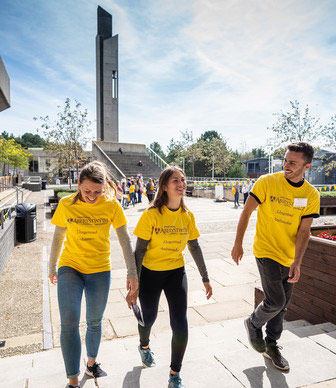About us
Welcome to the Department of International Politics, the first of its kind in the world!
Studying politics and international relations is vital to understanding our rapidly changing world. In a time of a climate emergency, political and ideological upheaval, rapid social change and economic uncertainty and increasing conflict, everyone has a stake in tackling these global challenges. Our teaching and research aims to inspire and support you to question, challenge, transform and build confidence in the way you think about politics and international relations.
Why come to the Department of International Politics?
Here in the Department of International Politics – Interpol for short – our Undergraduate programmes have three key characteristics: academic excellence, diversity of choice and a real community.
Excellence:
We pride ourselves on delivering great teaching and consistently score very highly for student satisfaction, as you can see from the bullet points below. Our staff deliver modules on their areas of expertise, so they are passionate and knowledgeable about what they teach, and students will learn the latest topics and ideas. This makes teaching a great experience for lecturers and students alike!
Choice:
Our modules cover a wide range of topics, from Russian Security to Contemporary Latin America via UK Politics, Climate Change, Nationalism and Modern Warfare. In years two and three, students can choose from around 20 options per year, which is a lot of choice! This diversity of choice is underpinned by strong core modules which provide the backbone of skills and knowledge.
Community:
Interpol has a close-knit yet cosmopolitan community which is supportive, stimulating and fun! We hold discussion events every semester and invite students to academic talks, but we also run pizza and quiz nights which bring together staff and students, including postgrads. The students are busy too, with the Interpol Society, Crisis Game and Model UN Society and the Department’s Undergrad Diversity Group. We also offer an exchange programme and our legendary Parliamentary Placement and Crisis Games. Everyone has a personal tutor and student mentors are available too.
Our Politics and IR League Table Rankings
- Top 5 in the UK for Student Experience for the subject of Politics (Good University Guide 2025, The Times and Sunday Times)
- Top 10 in the UK for Teaching Quality for the subject of Politics (Good University Guide 2025, The Times and Sunday Times)
- Top 10 in the UK for Student Satisfaction for the subject of Politics (Complete University Guide 2025)
- Top 10 in the UK for satisfaction with Teaching and Assessment for the subject of International Relations (Guardian University League Table 2025)
- 92% Overall Student Satisfaction for the Department of International Politics (National Student Survey 2024)
- Top 5 in the UK for Academic Support and Learning Opportunities for the subject of Politics* (National Student Survey 2024)
- 100% Overall Student Satisfaction for 142L International Relations (National Student Survey 2024)
Why Aberystwyth?
Aberystwyth is a vibrant, cosmopolitan university town, situated between the rolling Cambrian mountains and the stunning coastline of Cardigan Bay. You’ll be part of a campus university with its own sports centre and a busy Arts Centre, and you’ll be next door to the National Library of Wales - one of only five copyright libraries in the UK.
Aberystwyth University has recently been voted Top in England and Wales for Student Experience by The Times and Sunday Times' Good University Guide 2025. We were also voted Top in Wales for Student Satisfaction* in the 2024 National Student Survey for the 9th consecutive year.
*(National Student Survey 2024; Compared with the Times & Sunday Times' Good University Guide HEIs)


